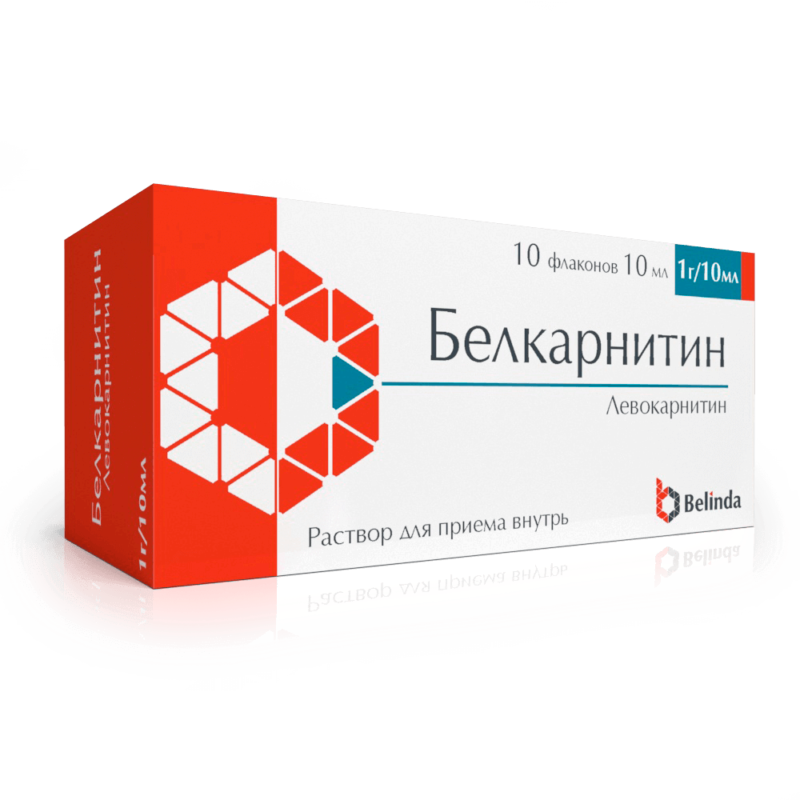
Belkarnitin Solution
PRESCRIPTION
Levokarnitin is directly or indirectly involved in various metabolic processes and is an important factor not only in the oxidation of fatty acids and ketone bodies, but also of glucose and some amino acids.
Manual
Each ml contains:
Levokarnitin 100 mg
excipients: malic acid, sodium benzoate, sodium saccharinate dihydrate, distilled water.
- secondary carnitine deficiency – congenital (organic aciduria), acquired alimentary carnitine deficiency (malabsorption, intestinal diseases), in patients receiving hemodialysis for a long time and having the following symptoms – severe constant muscle spasms, myopathies, loss of muscle mass, skeletal muscle weakness, symptoms of hypotension, anemia , impaired reabsorption in the kidneys (CRF);
- metabolic disorders in the myocardium in the case of ischemic cardiomyopathy (in the myocardium, the utilization of fatty acids as an energy source occurs very intensively, so it especially needs L-carnitine, after its use there is an increase in the strength of contractions, prevention of further muscle degeneration, normalization of the ECG);
- angina pectoris, acute myocardial infarction, a state of severe hypoperfusion due to cardiogenic shock;
- damage to the central and peripheral nervous system, respiratory distress syndrome, impaired psychomotor development, convulsions, ataxia, pyramidal disorders, disorders of the oculomotor nerves (external ophthalmoplegia, ptosis, etc.);
- polyneuropathy with liver damage (progressive hepatomegaly, liver fibrosis, the phenomenon of liver failure, kidney damage (Fanconi triad, phosphaturia, glucosuria, aminoacidation), endocrine disorders (growth retardation, hypoglycemia), hearing damage (sensorineural deafness), vision damage (optic atrophy , pigmentary degeneration of the retina, cataracts), gastrointestinal disorders;
- diseases and conditions accompanied by loss of appetite, loss of body weight, exhaustion in adults and children;
- anorexia nervosa syndrome (anorexia nervosa) and physical exhaustion in mental illness, dyscirculatory and traumatic encephalopathy;
- chronic pancreatitis with exocrine insufficiency;
- chronic gastritis with decreased secretory function;
- consequences of birth trauma and asphyxia of newborns;
- newborns, premature and full-term children with weakened feeding reflexes (sluggish sucking), with malnutrition, hypotension and adynamia; respiratory distress syndrome in newborns, nursing premature newborns on total parenteral nutrition;
- jaundice of newborns;
- during the period of convalescence after serious illnesses and surgical interventions;
- growth retardation and body weight deficiency in children and adolescents under 16 years of age, mild form of thyrotoxicosis in children and adolescents under 16 years of age;
- as part of complex therapy for skin diseases (psoriasis, seborrheic eczema, focal scleroderma and discoid lupus erythematosus);
- long-term intense sports training or other increased loads (as an anabolic and adaptogen) to increase performance, endurance and reduce fatigue;
- exogenous constitutional obesity.
FOR ORAL USE ONLY.
The drug is taken orally, the solution can be drunk undiluted or diluted with water or fruit juice. To determine the optimal dose, it is recommended to monitor therapy by measuring the levels of free and acyl levocarnitine in plasma and urine. Take regardless of food intake: daily dose depending on age and body weight – from 0 to 6 months, 50 mg/kg is recommended, from 6 months to 1 year – 100 mg/kg (1 ml of solution), from 1 year to 5 years – 1000 mg per day. Over 5 years: 2000 mg per day. Adults from 2 g to 4 g depending on the severity of the pathology and the doctor’s recommendations. Angina and post-infarction conditions: from 2 to 6 g per day (from 20 to 60 ml of the drug) as recommended by a doctor.
The course of treatment is 1 month. Adults with anorexia nervosa syndrome are prescribed 2 g 2 times a day. Duration of use: 1 – 2 months. To stimulate appetite and increase body weight, patients with chronic gastritis with decreased secretory function and chronic pancreatitis with exocrine insufficiency are prescribed Belcarnitine in a single dose of 500 mg 2 times a day. Duration of use: 1 – 1.5 months.
When treating skin diseases, a single dose is 1 g 2 times a day. Duration of use: 2 – 4 weeks.
For prolonged physical activity, prescribe 1-2 g 2-3 times a day 30 minutes before breakfast and lunch. Newborns are prescribed 30 minutes before feeding in a single dose (4-10 drops) 2 times a day, daily dose – 50-100 mg/kg. Prescribed from the first day of life or on the 5th day for children who have suffered birth trauma and asphyxia, and then for 2-6 weeks.